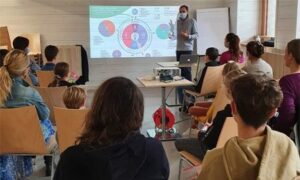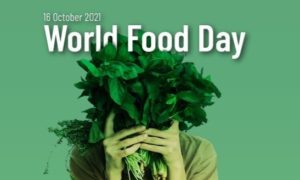Event World Day
World Food Day 2021
World Food Day is celebrated every year on 16 October. We all have a role to play to realize the vision of a world without hunger and malnutrition. We must not let sustainable habits fall by the wayside in times of crisis. We can make healthy food choices and do our part to reduce food waste. In addition, governments, enterprises, and organizations can share their knowledge and support sustainable, resilient food systems and livelihoods. Together, we can grow, nourish, and sustain our world.
2021 Theme: “Our actions are our future. Better production, better nutrition, a better environment, and a better life.”
World Food Day is celebrated each year on 16 October. Collective action across 150 countries is what makes World Food Day one of the most celebrated days of the UN calendar. Hundreds of events and outreach activities bring together governments, businesses, NGOs, the media, and the general public. They promote worldwide awareness and action for those who suffer from hunger and for the need to ensure healthy diets for all.
In 2021, World Food Day is celebrated under the theme “Our actions are our future. Better production, better nutrition, a better environment, and a better life.” #WorldFoodDay 2021 will be marked a second time while countries around the world deal with the widespread effects of the global Covid-19 pandemic. It’s a time to look into the future we need to build together.
Future of Food
An agri-food system is a complex term that may seem far from your reality, but do you know our lives depend on them? Every time we eat, we participate in the system. The food we choose and the way we produce, prepare, cook and store it make us an integral and active part of the way in which an agri-food system works.
A sustainable agri-food system is one in which a variety of sufficient, nutritious and safe foods is available at an affordable price to everyone, and nobody is hungry or suffers from any form of malnutrition. The shelves are stocked at the local market or food store, but less food is wasted and the food supply chain is more resilient to shocks such as extreme weather, price spikes or pandemics, all while limiting, rather than worsening, environmental degradation or climate change. In fact, sustainable agri-food systems deliver food security and nutrition for all, without compromising the economic, social and environmental bases, for generations to come. They lead to better production, better nutrition, a better environment and a better life for all.
Agri-food systems employ 1 billion people worldwide, more than any other economic sector. Moreover, the way we produce, consume and, sadly, waste food exacts a heavy toll on our planet, putting unnecessary pressure on natural resources, the environment and climate. Food production too often degrades or destroys natural habitats and contributes to species extinction. Such inefficiency, is costing us trillions of dollars, but, most importantly, today’s agri-food systems are exposing profound inequalities and injustices in our global society. Three billion people cannot afford healthy diets, while overweight and obesity continue to increase worldwide.
The COVID-19 pandemic has underlined that an urgent change of route is needed. It has made it even harder for farmers – already grappling with climate variability and extremes – to sell their harvests, while rising poverty is pushing an increased number of city residents to use food banks, and millions of people require emergency food aid. We need sustainable agri-food systems that are capable of nourishing 10 billion people by 2050.
International Year of Fruits and Vegetables
The UN General Assembly designated 2021 as the International Year of Fruits and Vegetables with the objectives:
- Raise awareness of and directing policy attention to the nutrition and health benefits of fruits and vegetables consumption.
- Promote diversified, balanced, and healthy diets and lifestyles through fruit and vegetable consumption.
- Reduce losses and waste in fruits and vegetables food systems.
- Share best practices on consumption and sustainable production of fruits and vegetables that contributes to sustainable food systems; improved sustainability of storage, transport, trade, processing, transformation, retail, waste reduction and recycling; integration of smallholders including family farmers into local, regional, and global production, value/supply chains for sustainable production and consumption of fruits and vegetables; and, strengthening the capacity of all countries, specially developing countries, to adopt innovative approaches and technology in combating loss and waste of fruits and vegetables.
Food Systems and the Environment
The way we produce and consumer food is deeply connected to our environment. While food is of course at the center of SDG2 – Zero Hunger, it is also an important component to achieve all Sustainable Development Goals. Transforming our food systems is essential to address the triple planetary crisis of biodiversity loss, climate change and pollution that we are facing today.
Our dedicated page on Food Loss and Waste dives deeper into issues at the nexus of food systems and the environment. It also lists relevant actions and actors in the Geneva region. Find out more below.
Events

Forum de l'alimentation durable
11 – 16 October 2021 | Geneva



